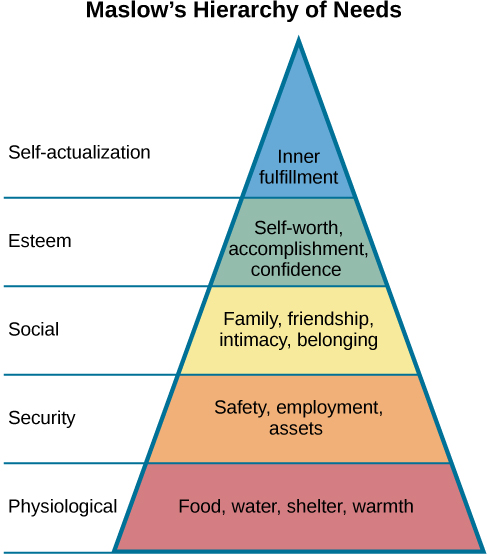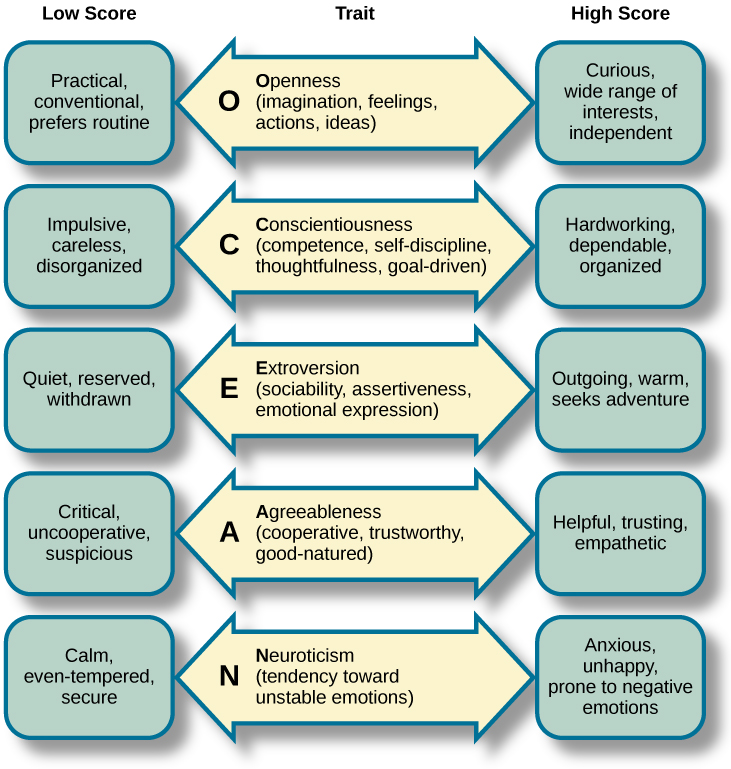Chapter 1: Introduction to Psychology
1.1 What is Psychology
- Psychology: the scientific study of the mind and behavior.
- The original definition only included the mind, but it was expanded to behavior because scientific studies only include observable phenomena, and the mind can’t be directly observed.
- The scientific method:
- Begins with a researcher asking a question about a phenomenon.
- Said researcher will form a hypothesis, which is a tentative explanation, of the phenomenon. The hypothesis must fit into the context of a scientific theory.
- A scientific theory is a general explanation of an aspect of the natural world that’s been consistently supported with evidence over time.
- Then the researcher will either make observations or create an experiment to test the hypothesis.
- The observations/experiment and the results are published so others can test and build on it.
- Every scientific explanation must be testable, meaning the phenomenon in question must be perceivable and measurable.
- Critical thinking: the ability and willingness to assess claims and make objective judgements on the basis of well supported reasons rather than emotion and anecdote.
1.2 History of Psychology
Wundt and Structuralism
- Wilhelm Wundt was a German scientist who was the first person to be considered a psychologist.
- He viewed psychology as the scientific study of the conscious experience and believed the goal of psychology was to determine the components of our conscious and how they worked together to create our conscious experience.
- To achieve this, he used introspection, which is a process where an individual objectively examines their own conscious.
- ^^Structuralism^^^^: understanding the structure or characteristics of the mind^^
James and Functionalism
- William James was an American psychologist who believed the purpose of psychology was to study the function of behavior in the world, which is now known as functionalism.
- ^^Functionalism studies how mental activities help organisms fit into their environment.^^
- It’s different from structuralism because it focuses on the mind as a whole instead of focusing on specific components.
Freud, Psychoanalytic Theory, and Gestalt Psychology
- ^^Sigmund Freud^^ ^^was an Austrian neurologist studied patients suffering from hysteria, which is a nervous disorder with no physical cause.^^
- Proposed that most of his patient’s hysteria stemmed from their unconscious mind.
- Believed that we repress our threatening urges and desires into the unconscious mind without awareness, and that we can access our unconscious mind through dream analysis, examinations of the first words that come to our minds, and conversational slip ups.
- Hysteria comes from our suppressed urges trying to surface.
- ^^Psychoanalytic theory^^^^: studies the function of an individual’s unconscious and early childhood memories.^^
- ^^Gestalt psychology^^^^: though a sensory experience can be separated into its individual parts, how those parts relate to each other as a whole is what a person typically perceives; the whole is greater than the sum of its parts^^
Pavlov, Watson, Skinner, and Behaviorism
- Ivan Pavlov was a Russian physiologist who studied condition reflex, a form of learning behavior in which an animal or human produced an unconscious reflex to a stimulus and was conditioned to produce that same response to a different stimulus that’s associated with the original stimulus.
- John B Watson was an American psychologist who focused on observable behavior instead of the mind because he believed it to be impossible to objectively analyze the mind. His approach to psychology is known as behaviorism, observing and controlling behavior.
- B.F. Skinner was an American behavioristic psychologist. He studied how behavior was affected by its consequences, and proposed that punishment and reinforcement are major factors that drive behavior.
Maslow, Rogers, and Humanism
^^Humanism^^^^: an approach to psychology that emphasizes the potential for good that is innate to all humans^^
Abraham Maslow was an American humanistic psychologist.
- He proposed a hierarchy of human need that motivate behavior, better known as Maslow’s hierarchy of needs.
- ^^In his hierarchy of needs, he stated that once basic needs for survival were met (food, water, shelter), higher-level needs (social needs) would motivate behavior.^^
- The highest-level needs relate to self-actualization, a process where an individual reaches their full potential.

Carl Rogers was an American humanistic psychologist who used a therapeutic technique called client-centered therapy, which involves the patient leading the therapy session and the therapist displaying three key characteristics: unconditional positive regard, genuineness, and empathy.
Multicultural Psychology and the Cognitive Revolution
- Many psychological theories and experiments are flawed because their test subjects and sample size consists only of the white American population.
- Multicultural psychology is very under-studied and remains a descriptive science.
- The cognitive revolution: a movement during the 1950s that brought the focus of psychology back to the scientific studies of the mind (involved linguistics, neuroscience, and computer science)
1.3 Contemporary Psychology
Biopsychology and Evolutionary Psychology
- ^^Biopsychology^^^^: the study of how biology influences our behavior, or more specifically, how the structure and function of the nervous system relates to our behavior; usually focuses on the immediate causes of behavior^^
- The interdisciplinary approach to biopsychology is often referred to as neuroscience.
- Evolutionary psychology: the study of the ultimate biological causes of behavior; predict the outcome of a behavior in a certain situation based on evolutionary theory.
- A limitation to evolutionary psychology is that they can’t provide concrete evidence to prove that a behavior is adaptive since they can’t be sure how much of the behavior is cultural vs genetic.
Sensation & Perception and Cognitive Psychology
- ^^Sensation and perception focuses on the physiological aspects of sensory systems and the psychological experience of sensory information.^^
- Cognitive psychology: the area of psychology that focuses on studying cognitions (thoughts) and their relationship to our experiences and actions.
Developmental Psychology
- ^^Developmental psychology^^^^: the scientific study of development across a lifespan (physical maturation).^^
- Early developmental psychologists focused on changes that occurred from childhood to adulthood and discovered the differences in physical, cognitive, and social capacities between infants and adults.
- Jean Piaget was one of these psychologists, and focused on cognitive changes from infancy to childhood to adulthood.
Personality Psychology
^^Personality psychology^^^^: studies the patterns of thoughts and behaviors that make each individual unique.^^
Early personality psychologists focused on explaining how an individual’s personality develops from their perspective. Nowadays, research in this filed focuses on identifying personality traits, measuring these traits, and determining how these traits interact in a particular context to determine how an individual will behave in any given situation.
Personality traits: relatively consistent patterns of thought and behavior
Five trait dimensions capture the variations in personality across individuals.
- These five dimensions are also known as the “Big Five” or the Five Factor model, and are conscientiousness, agreeableness, neuroticism, openness, and extraversion.

Social Psychology
- ^^Social psychology^^^^: studies how we interact with and relate to others^^.
- Stanley Milgram was an American social psychologist who conducted one of the most famous experiments known today to determine if the holocaust could happen in America.
- The results of his experiment showed that nearly two-thirds of the participants were willing to deliver what they thought were lethal shocks to another person, because they were instructed to do so by an authority figure.
Industrial-Organizational Psychology
- ^^Industrial-organizational psychology^^^^: applies psychological theories, principles, and research findings in industrial and organizational settings.^^
- I-O psychologists are often involved in personnel management, organizational structure, and workplace environment.
- Companies bring in I-O psychologists to help make the best hiring decisions and create an environment that increases employee productivity and efficiency.
Health Psychology
- Health psychology: studies how health is affected by biological, psychological, and sociocultural factors; the biopsychosocial model.
- Health psychologists seek to help people achieve better health through public policy, education, intervention, and research.
Sport & Exercise Psychology and Clinical Psychology
- Sport and exercise psychology: studies the psychological aspects of sport performance, such as motivation, performance anxiety, and the effects of sport on one’s mental and emotional wellbeing.
- Clinical psychology: studies the diagnosis and treatment of psychological disorders and other problematic patterns of behavior.
Forensic Psychology
- Forensic psychology: studies questions of psychology as they arise in the context of the justice system.
- Forensic psychologists usually act as expert witnesses and provide their research- or experience-based opinions.
- They must have a good understanding of the law and provide information in the context of the legal system.
- Forensic psychologists are also used in the jury selection process and witness preparation.
1.4 Careers in Psychology
- Many psychologists go on to get their PhD.
- After that, they can seek out positions in colleges, whether it be teaching or research, or get their PsyD to become practicing clinical psychologists, counselors, or psychiatrists.